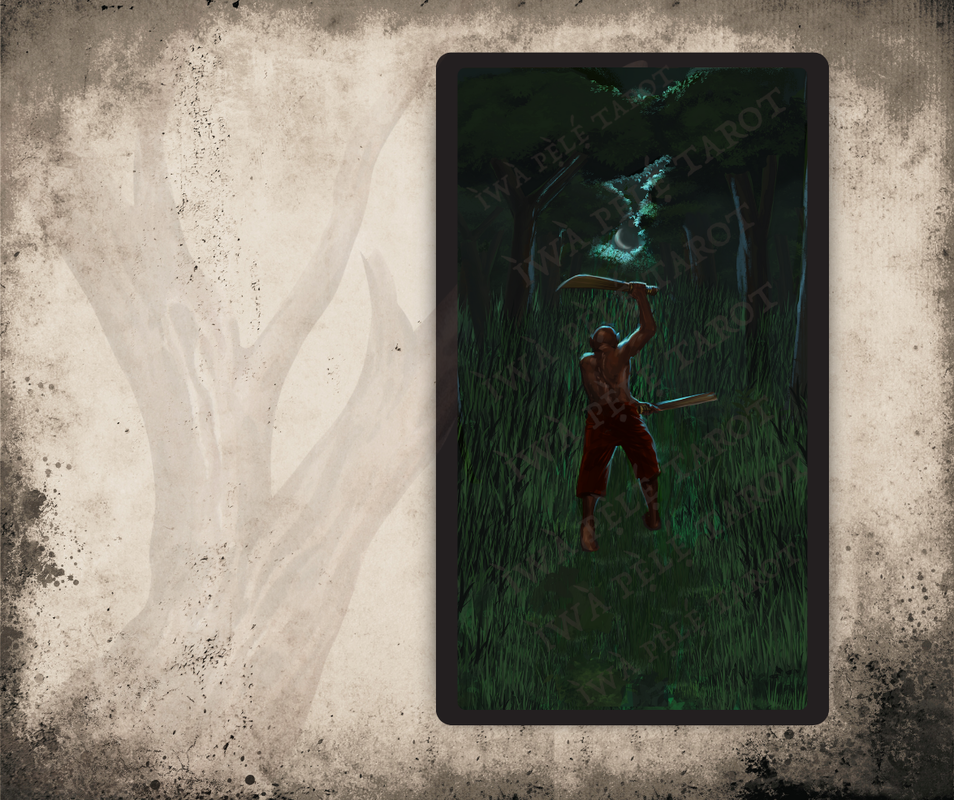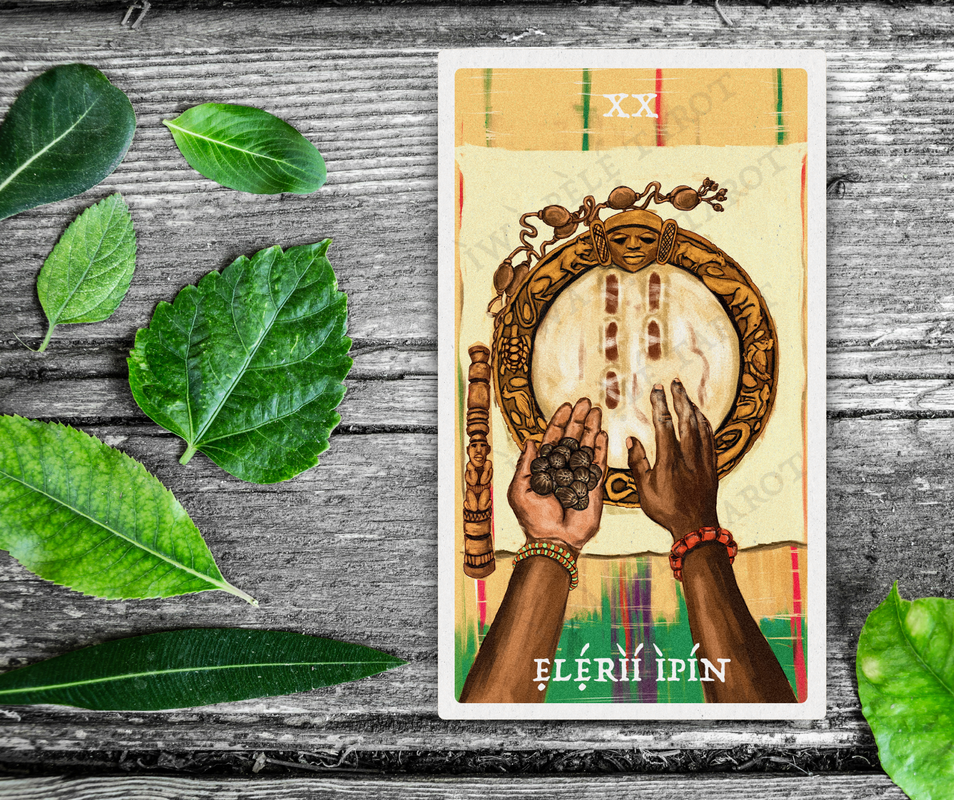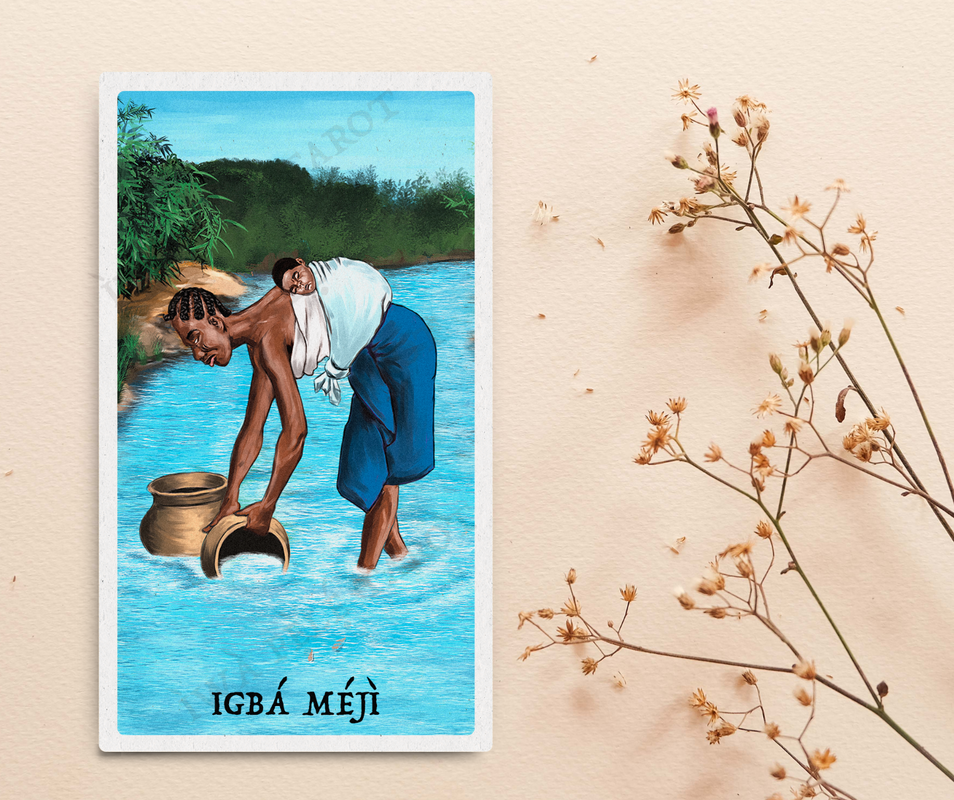|
© Excerpt from Ìwà Pẹ̀lẹ́ Tarot Handbook by Native Authority Tarot Ògún onídà méjì; ó fì kan ṣán oko, ó fì kan yènà ẹ̀. In the midst of a forest, a lone figure stands wielding two machetes. With lightning-fast swings, he cuts through the dense foliage, his movements fluid and graceful as he navigates the thick undergrowth. The tunnel vision takes over as he makes his way deeper into the forest, guided only by the light of the crescent moon. The grass beneath his feet rustles with each step, but the sound is drowned out by the rhythm of the machetes. Each swing of the blade is precise and calculated, as though he had done this a thousand times before. The task at hand is all-consuming, and the outside world fades away into the background. He works tirelessly through the night with unwavering determination and unbreakable focus. He knows that the path ahead may not be easy, but he remains steadfast, wilfully cutting through all obstacles in his way. As he forges ahead, the once impenetrable forest gives way, trees thin out and the path finally becomes clearer. Idà méjì is about deliberate, concerted effort and determination, and it draws strongly from Ògún’s focus and tenacity. In Yorùbá spirituality, the irúnmolè Ògún was sent to the earthly plane/realm to clear a path for the other irunmole with the objective of making the earth more habitable. Ògun is a maverick, a loner, a way-maker with unparalleled work ethic. No external stimuli or motivation is needed, as he is fully self sufficient, preferring to work alone. Unlike other irunmole, Ògún does not require light to operate, darkness does not faze him because he can see in the dark. Closely associated with Ògún is a sorcerer and tracker òrìṣà indigenous to the Ògùn state area of Nigeria called Òṣóòsi. The appellation Òṣóòsi is an elision of oṣó which means sorcerer or sorcery, and òsì, which means left or left hand side. The Oṣó are men who through certain rites and rituals have been granted permission to possess the Ìyàmi Àjẹ́ (Ìbà àwọn tó layé) spirit which then grants them the ability to astral travel, a feature inherent only to women, especially those who have become abiyamọ (mothers). The astral realm is considered to be the exclusive domain of the Ìyàmi Àjẹ́ (Ìbà àwọn tó layé) and men who seek to enter it must do so disguised as a female bird, which is why when male awo seek to enter the Igbódù they must wear a palm frond skirt and beads around their knees. Igbódù is an elision of igbó meaning bush and Odu, which is the embodiment of all sacred wisdom. In effect Igbódù means 'bush of sacred wisdom’ and acts as physical portal to gain access to the astral realm. A key part of Òṣóòsì’s tracker abilities is his mastery at astral travel and projection, which allow him to experience out of body experiences, and deploy monocular and binocular cues. Monocular means with or in one eye, while binocular means adapted for or relating to the use of both eyes. With monocular cues, Òṣóòsì achieves linear perception with his right eye and aerial perception with his left. In Ifá, the divination tray, known as ọpọ́n Ifá has both a left side and a right side. The right side represents the present and passing in the physical realm, that which can be seen with the naked eye, while the left side represents the present and imminent in the spiritual realm, that which can be perceived with the ojó inú (inner eye or third eye). The images received from both eyes are then combined into a single image or other visual elements such as a map or outline. This ability to view and understand a situation or landscape from two distinct perspectives is invaluable especially when operating in unfamiliar terrain or situations with reduced visibility. In circumstances where visibility is compromised, the first thing people normally do is to adjust and reduce speed in order to improve reaction time. Idà méjì teaches us that what we see with the physical eye is just one perspective, it is one dimensional and rarely ever the full picture. Visibility or lack thereof should not be the only deciding factor of velocity or rate of acceleration. With visualisation and deep meditation, we can receive the gift of astral projection, enabling us to use monocular cues to accurately judge depth, height and distance between ourselves and other beings or objects around us, thereby ensuring a precise outcome. Idà méjì is not just about clarity of thought or perhaps being unclear about available options, it is about being able to source and hold two thoughts, perspectives or images which represent the linear and aerial views. It is also about the ability to combine both thoughts, perspectives or images into a roadmap. Idà méjì does not require external validation to know the way. The determination and strength of Idà méjì inspires us to persevere through challenges and obstacles, and the blades serve as a symbol of our ability to cut through distractions and maintain our focus. Though the darkness around may seem intimidating, we must learn to view it as an opportunity to recalibrate the outer and inner eyes to be able to see in the dark, thereby enabling ease of navigation when the light fades or falters. Idà méjì assures us that ultimately with focus, tenacity, and the right tools, we can overcome any obstacle and achieve success. In Ire:
access, anticipation, astral projection, blind faith, concentration, detachment-from-distraction, dogged-determination, drive, dynamism, eye-opening, enigma, facing-fears, focus, fortitude, higher-calling, higher-purpose, imagination, insight, maverick, mental meandering, meditation, mindfulness, overcoming-fears, practicality, probity, purposefulness, resolve, seriousness, silence, tenacity, travel, unbeaten-path, visualization, volition In Ibi: agitated-mind, alienation, astigmatism, bewilderment, blind-faith, blindness, challenge, closed-mind, containment, denial, detachment, easily-carried-away-by-one’s-own-thoughts-and-imagination, going-against-the-grain, hearsay, hypocrisy, incommunicado, inflexibility, lack-of-communication, mechanical, muteness, off-track, refraction, robotic, separation, startled, suspicion, unalterable, wilful-ignorance © Excerpt from Ìwà Pẹ̀lẹ́ Tarot Handbook by Native Authority Tarot Ẹlẹ́rìí ní yanjú ẹjọ́; ẹlẹ́rìí kì ṣe elégbè. "Baba, baba o," a man called out as he rushed towards the door of the babaláwo's home. "Àbọru, àbọyè, àbọṣíṣẹ baba," he declared as he charged into the dwelling, throwing himself at the babaláwo's feet in prostration. "Ogbó atọ́, àsúre ìwòrì wòfún," the babaláwo responded with a slight irritation at the brusque entrance. "Baba, ẹ nìí bínú sí mi, please excuse my coarseness, but I need your help!" he said as he tried in vain to calm himself. The babaláwo did a quick assessment and asked the man to sit down. Noting the deep worry etched upon his face and what seemed like heightening levels of distress, he said to him, "Má wií tẹ̀lẹ́mi, repeat after me, títù títù là ńbá Olúwerí, tójú bá farabalẹ̀, á á rímú, with a cool demeanour is how one always finds Olúwerí, if the eyes calm down, they will see the nose." "Keep repeating it; keep going," the babaláwo encouraged. The man repeated the phrase over and over, until he was calm. "Modúpé baba, mo júbà baba." "Ìbà Olódùmarè," replied the babaláwo, who was eager to get to the bottom of the matter. "Now, tell Ifá why you are here and what needs resolving." The man took out a couple of cowries from his pocket and started to whisper his request, after which he raised them to his forehead with a light touch. He proceeded to hand them over, but the babaláwo, said, "Múu lu lẹ̀, place them on the ground." The man complied. The babaláwo picked up the ọ̀pẹ̀lẹ̀ and dangled it over the cowries, touching them with its ends. "Ifá, have you heard what has been said to the cowries?" he asked as he began the divination process. Ifá is a geomantic knowledge system through which diviners, who have to undergo years, sometimes decades, of training and immersion, interpret and explain the past, unfolding events, and the unknown. It is a system of divination based on 16 basic sets and 256 derivatives, forming a double tetragram produced by the manipulation of the ìkín (sixteen palm nuts) or the ọ̀pẹ̀lẹ̀ (divining chain with eight half-seed shells). The word Ifá is synonymous with Òrúnmìlà, the Irúnmọlè or primordial Òrìṣà of wisdom, knowledge, and divination. Òrúnmìlà is known as Ẹlẹ́rìí Ìpín, which, loosely translated, means ‘witness at the allotment of destiny’, a process which every Orí must undergo before descending into the earthly realm. According to the holy Odu verses, Òrúnmìlà is the eyewitness when we kneel before Olódùmárè to receive and accept our ìpín, which is classified into Àkúnlèyàn, Àkúnlègbá and Àyànmó. Àkúnlèyàn means 'that which is chosen while kneeling', and corresponds to the part of destiny selected based on free will. Àkúnlègbá means 'that which is accepted while kneeling' and is given to complement that which was freely chosen. Àyànmó is described as aspects of destiny that are fixed and cannot be changed, and I believe that it houses residual karmic matter from previous states of existence or past lives. Through petition and vigorous works, an insufferable Àkúnlèyàn and Àkúnlègbá could potentially be rectified by Ifá, Atún Orí eni tí kò sunwọ̀n ṣè, meaning 'He who repairs the Orí of the unfortunate'. The first Ifá priest and fair adjudicator, Òrúnmìlà, has a deep understanding of the human condition and mediates between mortals and celestial beings to resolve problems and restore harmony. He is also the custodian of the Ifá literary corpus, which contains codified information on the timeline of every Orí in the earthly realm. I believe that the Ifá literary corpus, containing 256 Odù Ifá, embodies what is known as the Akashic Records. Everyone in the earthly realm is born with a specific Odù out of the 256 derivatives. According to Yorùbá tradition, three days after the birth of a child, a ceremony called Àkọsẹ̀jayé, meaning 'first feet or first steps in Ayé (earth)', is performed to determine the child's Odù. During the ceremony, the child's parents are given specific information based on the Odù revealed on possible life paths and professions, which helps prevent unnecessary endeavors, wanderings, and wonderings about purpose and destiny. The parents are also informed about possible milestones and setbacks, thereby enabling them to prepare for those life events and set proper expectations for their child in its pursuit of reaching its full potential. Everything before, during, and after a birth points to the signing and actualization of an agreement, with the terms and conditions clearly listed out. In many countries, not all contracts require a witness, but for those that do, the witness must be an authorized official. In fact, many countries usually have a list of officials authorized to witness the signing of official documents and contracts. This includes, but is not limited to, judges, magistrates, lawyers, registrars, notaries, coroners, police officers, social workers, and government officials. Òrúnmìlà is called to bear witness when we sign the destiny contract with Olódùmárè. As Orí prepares to descend into the earthly realm by drinking from the river of forgetfulness and submitting itself to the rigors of birth, Òrunmìlà retains a copy of our contract, part of which is codified as a specific Odù, ready to reveal it to us in the ìyèrosù upon the surface of the opón Ifá, ready to assist us through our sojourn in Ilé Ayé. The Ẹlẹ́rìí Ìpín reminds us that co-creation is a big part of the birth and rebirth cycle, with Olódùmárè actively involving us in the formulation of our own destiny. We have free will to choose and accept the requisites, thereby setting up the parameters for our own final judgment. It reminds us that judgment is never done in isolation, and it is not one size fits all. It is based on choices made in the earthly realm in relation to the terms selected and conditions accepted in the heavenly realm. It turns out, after all, that we are indeed the masters of our fate and the captains of our soul. In Ire: Absolution, acquittal, apology, appeasement, atonement, catharsis, compassion, confession, conscientiousness, covenant, cosmic consciousness, discernment, divination, duty, evolution, exoneration, exorcism, expiation, forgiveness, harvest, irreversibility, liberation, mediation, mercy, oath, order, outcome, patterns, peace-offering, perfect balance (between reasoning and intuition), probity, prophecy, propitiation (ètùtù), purification, purpose, readjustment, rebirth, redemption, release, remission, remorse, renunciation, restitution, revelation, review, reward, righteousness, self evaluation, surrender, threshold, vindication, winnowing, wisdom
In Ibi: Accusation, amorality, breach, chaos, complicity, concealment, condemnation, consequences, corruption, culpability, death, defiance, eclipse, futility, guilt, hecatomb, incitement, indiscretion, inertia, injudiciousness, insubordination, irreversibility, limits, martyrdom, mercilessness, non-compliance, oath-breaking, omission, petrifaction, provocation, punishment, purgation, rebellion, remorselessness, renunciation, resignation, resistance, scapegoat, self-immolation, suppression, suspension, threshold, treachery, trials, tribulations, unrepentance © Excerpt from Ìwà Pẹ̀lẹ́ Tarot Handbook by Native Authority Tarot Abiyamọ, ab'ọ̀já gbòrò gboro A stream flows gently under the glow of the early morning sun. An abiyamọ with a baby strapped to her back stands quietly, fetching water with two earthenware water pots. The air is still and cool, as ripples upon the clear blue water sparkle and dance in the sunlight. The baby on her back sleeps blissfully, at peace and content to be close to its mother’s comforting warmth, scent, and touch, reassured of her affection and devotion. The serene moment radiates feelings of peace and tranquility, as if basking in the warm embrace of the sun, and captures the essence of emotional harmony and the deep bond of love between mother and child. As with many Yorùbá words and phrases, abiyamọ has no direct translation in English; the closest meanings are nurturer, one who has risked life to birth life, sustainer and mother. In traditional Yorùbá culture, motherhood is highly desirable and celebrated, with expectant mothers almost deified and termed abaraméjì, meaning ‘a being with two bodies’ or ‘one, dual in nature’. It is said that the process of going from abaraméjì to abiyamọ is powerful and transformative and carries supreme aṣẹ. This is why the Yorùbás say “Òrìṣà bí ìyá ò sí l’áyé” (No other Òrìṣà like the mother exists on earth). Igbá Méjì speaks to the depths of human connections and emotional bonds. It reminds us of the beauty of unconditional love, the importance of finding harmony and balance, and the power that comes from the union of two individuals or energies. Incorporating the symbolism of abaraméjì, this card encourages us to embrace the concept of duality and recognize the strength that comes from partnerships. Be inspired to cultivate deep, meaningful connections and celebrate the power of love and togetherness. Dedicating one’s life to another is the ultimate expression of love. It transcends the fleeting pleasures and material possessions, providing a deeply felt sense of fulfillment and purpose. Despite what many people believe, it is not about losing one's identity or self in the process, but about finding a deeper sense of purpose and fulfilment through the bond shared with a loved one. It is about building a partnership based on trust, respect, and mutual growth. Together, two individuals embark on a shared journey, shaping each other’s lives and experiences. But even as Igbá Méjì draws on the unparalleled connection between the abiyamọ and the child, life progresses, seasons change and roles shift. The nurturer becomes the nurtured, and the nurtured becomes the nurturer, transforming the bond between an adult child and an elderly parent. The once-dependent child now assumes the role of a caregiver, providing love, care, and support for their aging parent. Despite the challenges that come with the passage of time, the connection grows stronger, transforming into one based on mutual admiration and gratitude. Dedicating one’s life to another is a beautiful testament to the depth of our capacity to love and be loved. In Ire: Admiration, affection, affinity, agreement, compassion, compromise, connection, devotion, engagement, interdependence, mutual love, nonpartisanship, optimism, partnership, receptiveness, reconciliation, self love, sincerity In Ibi: Ambiguity, antagonism, anxiety, bigotry, bitterness, calumny, codependency, disconnection, discord, disparity, disregard, dissolution, enmity, hesitation, hypocrisy, indifference, impressionable, liability, neglect, pessimism, possession, restriction, separation, tough love
|





